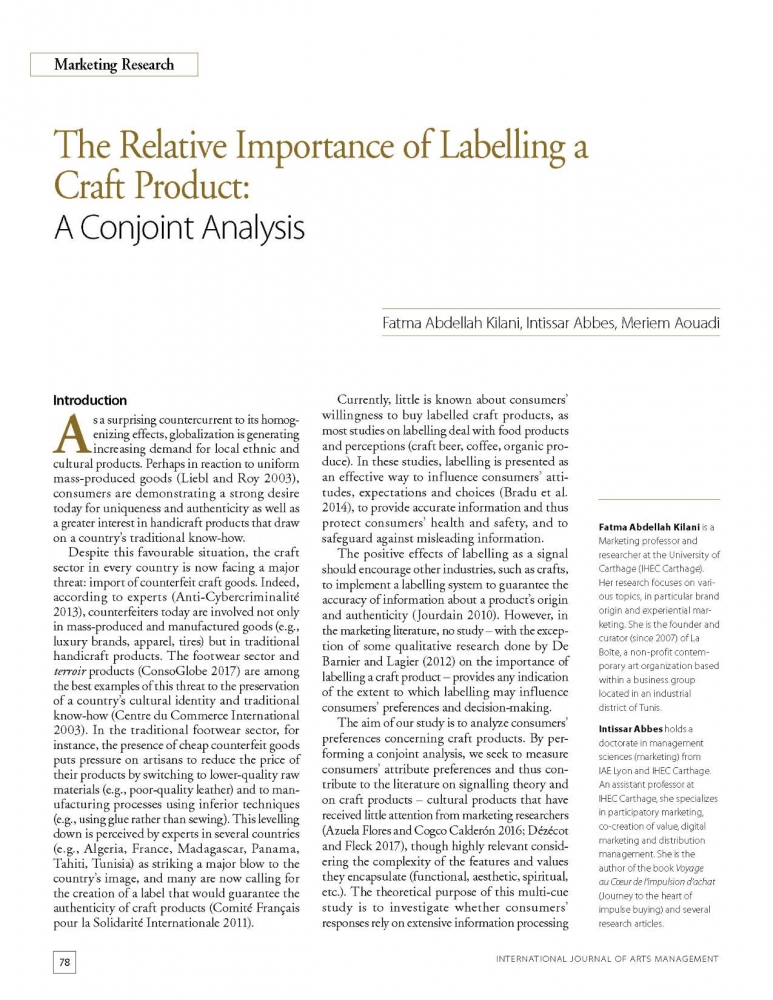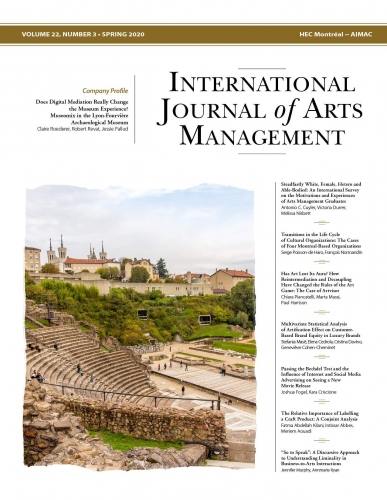The Relative Importance of Labelling a Craft Product: A Conjoint Analysis
Produit: Article
21,00 $ CA
Fatma Abdellah Kilani, Intissar Abbes, Meriem Aouadi
Fatma Abdellah Kilani is a Marketing professor and researcher at the University of Carthage (IHEC Carthage). Her research focuses on various topics, in particular brand origin and experiential marketing. She is the founder and curator (since 2007) of La Boîte, a non-profit contemporary art organization based within a business group located in an industrial district of Tunis.
Intissar Abbes holds a doctorate in management sciences (marketing) from IAE Lyon and IHEC Carthage. An assistant professor at IHEC Carthage, she specializes in participatory marketing, co-creation of value, digital marketing and distribution management. She is the author of the book Voyage au Cœur de l’impulsion d’achat (Journey to the heart of impulse buying) and several research articles.
Meriem Aouadi, a graduate of IHEC Carthage, works as a marketer with a focus on the creative industries. She specializes in brand management, marketing strategy, and digital communication and has founded a platform that promotes and supports fashion entrepreneurs. Pursuing projects based on their social impact, Meriem’s most recent project promotes sustainability through an upcycling approach in fashion.
ABSTRACT
The consumption of craft products is currently flourishing, partly as a mode of individual self-expression and legitimization in postmodern society. This study deals with consumers’ preferences in a context where the spread of counterfeit goods due to globalization is threatening traditional handicrafts. To analyze the attribute preferences of consumers, a conjoint analysis was conducted (N = 303) on three highly relevant attributes identified by a preliminary study and prior research: label, region of origin (RO) and price. The results indicate that the label is the most important of the three attributes, while price is the least relevant to consumers. Novices and low-involved consumers perceive price as a more relevant criterion, while experts and high-involved consumers attach greater importance to the label and the RO, two high-scope signals of product authenticity. Managerial and research implications are discussed.
KEYWORDS
Craft products, conjoint analysis, label, region of origin, price, expertise
RÉSUMÉ
La consommation de produits artisanaux est actuellement en plein essor, en partie en tant que mode d’expression individuelle et de légitimation dans la société post-moderne. Cette étude porte sur les préférences des consommateurs dans un contexte où la distribution de produits contrefaits en raison de la mondialisation menace l’artisanat traditionnel. Afin d’analyser les préférences des consommateurs quant aux attributs d’un produit, une analyse conjointe a été menée (n = 303) sur trois attributs hautement pertinents identifiés par une étude préliminaire et des recherches antérieures : l’étiquette, la région d’origine et le prix. Les résultats indiquent que l’étiquette est le plus important des trois attributs, tandis que le prix est le moins pertinent aux yeux des consommateurs. Les novices et les consommateurs peu impliqués perçoivent le prix comme un critère davantage pertinent, tandis que les experts et les consommateurs fortement impliqués accordent une plus grande importance à l’étiquette et à la région d’origine, deux indicateurs clairs de l’authenticité du produit. Les implications pour la gestion et la recherche sont discutées.
MOTS CLÉS
Produits artisanaux, analyse conjointe, étiquette, région d’origine, prix, expertise
RESUMEN
El consumo de productos artesanales está actualmente en pleno auge, en parte como un modo de autoexpresión y de legitimación en la sociedad posmoderna. En este estudio se plantean las preferencias del consumidor en un contexto donde la difusión de bienes falsificados como resultado de la globalización amenaza las artesanías tradicionales. Para analizar las preferencias de los consumidores por atributos, se llevó a cabo un análisis conjunto (N = 303) sobre tres atributos altamente significativos identificados en un estudio preliminar de una investigación anterior: la etiqueta, la región de origen (RO) y el precio. Los resultados indican que para el consumidor la etiqueta es el más importante, el precio siendo el menos relevante. Los neófitos y los consumidores poco involucrados perciben el precio como un criterio de mayor relevancia, mientras que para los expertos y los consumidores muy involucrados la etiqueta y la RO adquieren mayor importancia, dos señales que tienen gran alcance para la autenticidad del producto. Se examinan las consecuencias para la gestión y la investigación.
PALABRAS CLAVE
Productos artesanales, análisis conjunto, etiqueta, región de origen, precio, pericia

